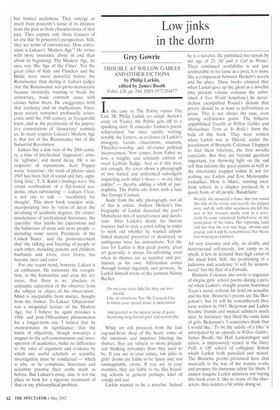Low j inks in the dorm
Grey Gowrie
TROUBLE AT WILLOW GABLES AND OTHER FICTIONS by Philip Larkin, edited by James Booth Faber, £20, pp. 544, ISBN 0571203477 In the case of The Public versus The Late Mr Philip Larkin (to adapt Auden's essay on Yeats), the Public gets off to a spanking start. It concedes Larkin's poetic achievement but cites sundry writing, notably the Letters, as evidence of Larkin's misogyny, racism, chauvinism, onanism, Thatcher-worship and all-round political incorrectness. Now comes, from Faber no less, a weighty and scholarly edition of overt Lesbian fladge. And as if this were not enough, the cover shows a photograph of two hatted and uniformed schoolgirls
inspecting each other's shoes or are they ankles? — thereby adding a whiff of paedophilia. The Public sits down with a face like George Carman.
Aside from the silly photograph, not all of this is unfair. Andrew Motion's fine biography of Larkin dissected the poet's Manichean mix of secretiveness and narcissism. After Larkin's death, his literary trustees had to seek a court ruling in order to work out whether he wanted unpublished material preserved or destroyed, so ambiguous were his instructions. Yet the case for Larkin is that great poetry, great art generally, is always life-affirming, even when its themes are as negative and pessimistic as his own. Affirmation comes through formal ingenuity and prowess. As Larkin himself wrote of the jazzman Sidney Bechet:
On me your voice falls like they say love should, Like an enormous Yes. My Crescent City Is where your speech alone is understood And greeted as the natural noise of good, Scattering long-haired grief and scored pity.
While art still proceeds from the foul rag-and-bone shop of the heart, some of the emotions and impulses littering the shelves, they are subject to more prejudicial thinking nowadays than they used to be. If you are in your sixties, low jinks in girls' dorms are liable to be funny and, not unimaginably, erotic. If you are in your twenties, they are liable to be, like boarding schools in general perhaps, kind of creepy and sad.
Larkin wanted to be a novelist. Indeed he is a novelist. He published two novels by the age of 25, Jill and A Girl in Winter. Their continued availability is not just attributable to his fame as a poet; it is more like a comparison between Beckett's novels and his plays. These books ensured that when Larkin gave up the ghost as a novelist (the present volume contains the unfinished A New World Symphony) he nevertheless exemplified Pound's dictum that poetry should be at least as well-written as prose. This is not always the case, even among well-known poets. The hitherto unpublished Trouble at Willow Gables and Michaelmas Term at St Bride's form the bulk of this book. They were written when Larkin was at Oxford, under the pseudonym of Brunette Coleman. I happen to find them hilarious, the first novella especially. But they are beyond question important, for throwing light on the sad self that informs the great poems as well as the entertainer trapped within it; not for nothing are Larkin and Eric Morecambe lookalikes. Here is Marie, running away from school, in a chapter prefaced by a quote from, of all people, Baudelaire:
Wearily she mounted a fence that ran round this side of the wood, and wearily she slipped over, and oh, with what weariness she felt the seat of her trousers neatly torn in a semicircle by some unnoticed barbed-wire on the cross-piece of the fence. Her exploring hand told her that the rent was large, obvious and crucial, and it will be remembered that Marie was wearing no knickers.
All very tiresome and silly, no doubt, and heterosexual self-parody, low camp so to speak, is less in demand than high camp of the usual kind. Still, the positioning of a judicious and academic 'it will be remembered' has the flair of a Firbank.
Brunette Coleman also wrote a sequence of elegiac girls' school poems during a period when Larkin's straight poems borrowed Yeats's music without his hold on actuality and his bite. Brunette's poems are like Betjemads, but (it will be remembered) they were written in 1943. Betjeman and Larkin became friends and mutual admirers much later. In literature, they liked the same kind of girls. Betjeman's 'I sometimes think that I would like / To be the saddle of a bike' is anticipated by an episode in Willow Gables. James Booth, the Hull Larkinologist and editor, is impressively versed in the Daisy Pulls it Off school of collegiate fiction which Larkin both parodied and mined, The Brunette poems presented here chat musically in the way of the mature works and prepare his immense talent for them. I cannot imagine Larkin admirers not buying this book even if, like so many of the characters, they redden a bit while doing so.






































































 Previous page
Previous page